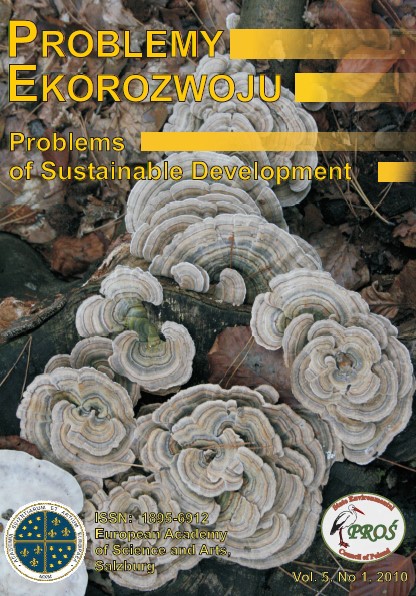Model of Permanent Eco-chemical Education of Employees of Chemical Industry in the Function of Ecological Development
Article Sidebar
Issue Vol. 5 No. 1 (2010)
-
Humanitarian Motives for Sustainable Developments in a Global Economy: An Essay
Paul T. Durbin9-13
-
A Curmudgeon’s Thoughts on Sustainability
David L. Russell15-22
-
Human Progress Towards Equitable Sustainable Development: A Philosophical Exploration
Victor Udo, Artur Pawłowski23-44
-
A Multifunctional Mosaic of Green Spaces in the Context of the Lower Silesia Region (Southern Poland) Sustainable Development
Anna Zaręba45-51
-
Model of Permanent Eco-chemical Education of Employees of Chemical Industry in the Function of Ecological Development
Stanko Cvjetićanin, Mirjana Segedinac, Jasna Adamov53-58
-
Decade of Education for Sustainable Development – Polish Challenges
Tadeusz Borys59-70
-
Some of the Theoretical Sustainable Development Aspects in the Reflection of the Christian Middle Ages Philosophy
Krzysztof Bochenek71-79
-
Polish and German Experiences in Planning and Implementation of Sustainable Development
Aleksandra Kuzior81-89
-
Biodiversity Conservation as One of Necessary Conditions of Ecodevelopment
Andrzej Urbisz91-94
-
Transformation of Cultural Landscapes in the Light of the Idea of Sustainable Development
Urszula Myga-Piątek95-108
-
A Cybernetic Approach to Sacrum – Profanum Relation
Lesław Michnowski109-138
-
Problems of Evaluation of Sound and Smell Discomfort in Sustainable Development
Sebastian Bernat139-144
-
Book Review: W. Sztumski, Quo ruis homo? Środowisko życia, czas, ludzie, 2008
Ignacy S. Fiut145-148
-
Book Review: L. Gawor, Szkice o cywilizacji, 2009
Jacek Lejman145-151
-
Letter to the Editorial Office: Sustainable Economy Based on Knowledge
Bazyli Poskrobko153-154
-
Communiques on Activities of the State Environmental Council of Poland
Tomasz Winnicki157-166
Archives
-
Vol. 7 No. 2
2012-07-02 14
-
Vol. 7 No. 1
2012-01-02 12
-
Vol. 6 No. 2
2011-07-01 19
-
Vol. 6 No. 1
2011-01-03 18
-
Vol. 5 No. 2
2010-07-01 21
-
Vol. 5 No. 1
2010-01-04 16
-
Vol. 4 No. 2
2009-07-01 19
-
Vol. 4 No. 1
2009-01-05 22
-
Vol. 3 No. 2
2008-07-01 19
-
Vol. 3 No. 1
2008-01-02 12
Main Article Content
Authors
Abstract
Employees of chemical industry play a significant role in environmental protection. In order to solve environmental problems it is necessary for them to improve knowledge on environmental impact of chemicals which they come in contact with. The aim of research is the analysis of the ecochemical knowledge in employees of the fertilizer industry in the Novi Sad region (Serbia), and structuring of chemical contents for further increase of their knowledge. Analytical and descriptive methods were used. The research instrument was a questionnairre, specially designed for the purpose of this research. Techniques of research were: field investigation, action investigation and combined techniques. It was shown that workers have certain, but insufficient knowledge of environmental effect of chemical pollutants. They should improve the existing and acquire new knowledge. A model of differentiated eco-chemical education was created for permanent adult professional education.
Keywords:
References
DJUKANOVIC, M., Životna sredina i održivi razvoj, Elit, Beograd 1996.
MARKOVIC, D., DJARMATI, S., GRZETIC, I., Fizičkohemijski osnovi zaštite životne sredine, knjiga I, Univerzitet u Beogradu, Beograd 1995.
ANDEVSKI, M., Uvod u ekološko obrazovanje, Univerzitet u Novom Sadu, Filozofski fakultet, Novi Sad 1997.
WHITE, L., 2004, A Workable Future: Delineating the Role of Education in Environmental and Economic Sustainability, in: New Horizons in Adult Education, no. 18(4), pp. 39-50.
MARKOVIC, D., DJARMATI, S., GRZETIC, I., Fizičkohemijski osnovi zaštite životne sredine, knjiga II, Univerzitet u Beogradu, Beograd, 1996.
MATIJEVIC, M., 2008, New (Multi)media Environment and Lifelong Learning, in: Andragogy, no. 20(1), pp. 19-28.
SCHMIDT, B., 2007, Older Employee Behaviour and Interest in Continuing Education, in: Journal of Adult and Continuing Education, no. 13(2), pp. 55-71.
OLJACA, M., Andragogija, psihološke osnove učenja odraslih, Univerzitet u Novom Sadu, Filozofski fakultet, Novi Sad, 1997.
Article Details
Abstract views: 34
License

This work is licensed under a Creative Commons Attribution-ShareAlike 4.0 International License.


